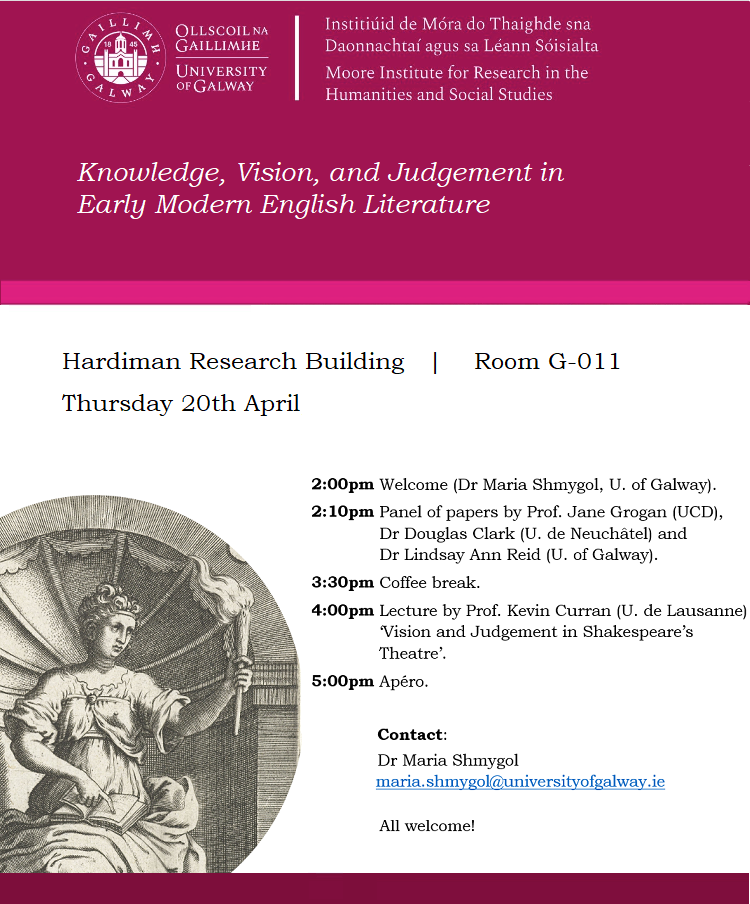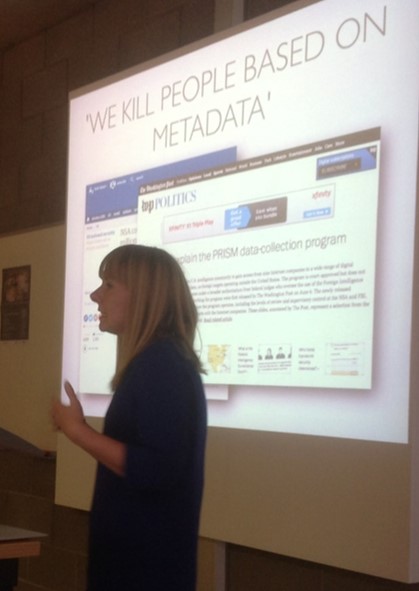
More info at the Moore Institute website here.

More info at the Moore Institute website here.
The exhibition “Readers & Reputations: The Reception and Circulation of Early Modern Women’s Writing, 1550-1700” will be held in the foyer of the Hardiman Research Building, NUI Galway. The exhibition runs from 16th January to 2nd April 2020.
This exhibition showcases the work of RECIRC and is funded by the Irish Research Council. RECIRC is a 5 year project that has produced a large-scale, quantitative analysis of the reception and circulation of women’s writing from 1550 to 1700, and is funded by the European Research Council. For more on the project, see the RECIRC website, follow the project on Twitter at @RECIRC_ or contact the project’s Principal Investigator Prof Marie-Louise Coolahan.

[From the Galway International Arts Festival website.]
Professor James Shapiro, widely acknowledged as one of world’s leading and most entertaining Shakespeare scholars (author of 1599: A Year in the Life of William Shakespeare) will discuss the uses and misuses of Shakespeare to divide America, the subject of his next book. He will be interviewed by Professor Patrick Lonergan, Professor of Drama and Theatre Studies, NUI Galway.
DATE & TIME: 20 July 2019 5pm
VENUE: Aula Maxima, NUI Galway
TICKETS: €10 available from the Galway International Arts Festival website.
“Renaissance Prose: New Directions” – a meeting of the Irish Renaissance Seminar at NUI Galway, Saturday 5th May 2018
1.30pm: Welcome
1.45‐3.15pm: Panel
3.15‐45pm: Refreshments
3.45‐4.45pm: Plenary
4.45pm: Close of meeting
6.30pm: Dinner (optional)
To express interest in attending, please contact Prof. Marie‐Louise Coolahan (marielouise.coolahan@nuigalway.ie) or Prof. Daniel Carey (daniel.carey@nuigalway.ie).
This event is generously sponsored by the Moore Institute for Research in the Humanities and Social Studies, NUI Galway, and the Society for Renaissance Studies.

[Main image: Edward Cocker’s The Pen’s Triumph, 17th c.]
This one-day interdisciplinary symposium, presented by the Women’s History Association of Ireland, will be held at the Moore Institute in NUI Galway on Friday 16th February 2018.
This will bring together leading and emerging scholars from a variety of disciplines currently engaged in cutting-edge research on the history of early modern Irish women. Keynote lectures will be delivered by Professor Mary O’Dowd (QUB) and Professor Jane Ohlmeyer (TCD). Other confirmed speakers include Sparky Booker (QUB), Felicity Maxwell (NUIG), Frances Nolan (UCD), Clodagh Tait (MI), Evan Bourke (NUIG) and Jane Maxwell (TCD). The symposium is free to attend, but advance registration is necessary.
For further details, contact the organiser Dr Bronagh McShane at: bronagh.mcshane@nuigalway.ie
For more on the Women’s History Association of Ireland, see the WHAI blog here.
The RECIRC conference “Reception, Reputation and Circulation in the Early Modern World, 1500-1800” is in full swing at NUI Galway. Follow along on Twitter with the conference hashtag #recirc17 and at the project handle @RECIRC_.
Guest report by Dr Carrie Griffin
The Centre for Early Modern Studies, Limerick, was delighted to welcome delegates and speakers to the autumn meeting of the Irish Renaissance Seminar, held for the first time at the University of Limerick. We gathered on a beautiful, crisp Saturday in UL’s Kemmy Business School for an afternoon of papers on the theme “Early Modern Otherness: Outlaws, Exiles, Outsiders”.

Our three-paper panel session opened at 1pm with Dr Clodagh Tait, a lecturer in the History Department at Mary Immaculate College, Limerick and a member of the executive committee of the Limerick Centre for Early Modern Studies. Clodagh’s paper, entitled “Outlawed Emotions: Lordly Rage and its Consequences in Early Modern Ireland”, was concerned with what the State Papers can tell us about the language around reports of emotional outbursts, cursing, oaths, and verbal violence, in particular focusing on Turlough Luineach, seemingly renowned for overawing others through rage and violent language. She argued that our sense of an idealised Irish lord, an impression formed from the honour values associated with that community and the praise-poetry composed for them, might in fact be challenged by this evidence, which seems to have more to do with emotional responses in a predominantly “face-to-face society”.

Dr Clodagh Tait
The Gaelic lords and the peculiar nuances of Bardic poetry were the subject of the second paper in this panel. Dr Gordon Ó Riain’s paper “A Fifteenth-Century Ulster Poet in Exile”, traced the fortunes of Conchubar, a poet exiled by his patron ÉinrÍ (one of the O’Neill of TÍr Eoghain). From his uncertain position as an outcast in Connacht, the poet composed a poem that includes a warning of an impending full satire; this warning found formal expression in the poem in a tréfocal, and its inclusion augments the kind of praise offered by the poet in this context.
Finally in this session Evan Bourke, a PhD researcher with the RECIRC Project, NUIG, presented a paper entitled “The ‘Burden[some] Sister’: The Reception and Representation of Jean Appelius (nee Dury) in the Hartlib Circle, 1641-1661”, showcasing research on letters that evidence the social exclusion suffered by Jean Appellius, sister to John Dury, that can be found in letters written by Dorothy Moore, her sister-in-law. Though no letters written by Jean are extant, Moore’s letters to members of the circle show that Jean was a problematic figure in the Dury circle: she was considered to be less than pious, and described in very strong terms in correspondence. Bourke’s contention was that the letters evidence a project of ‘othering’ within a close network, containing very great detail about Jean but also a very strong dismissal of her.

Evan Bourke
After tea we were treated to a plenary lecture by Dr Ruth Ahnert. Ruth, a senior lecturer in Renaissance Studies at Queen Mary University of London and a co-director (with Prof Joad Raymond) of the Centre for Early Modern Mapping News and Networks, is currently conducting research on Tudor Networks of Power, in which she combines digital methods from the field of Complex Networks to study Tudor letters from the State Papers. Ruth’s fascinating lecture, entitled “Conspiracy and Surveillance in Tudor England”, demonstrated how Complex Network analysis can be incredibly revealing for Tudor letters, exploiting and studying similar aspects such as nodes, hubs and edges to reveal similar underlying patters and real-world networks. Ruth showed us in great detail how this kind of collaboration (undertaken with her husband Sebastian Ahnert) can uncover all sorts of activity and connections between suspected spies, conspirators and double-agents that would not ordinarily be discernible in traditional approaches to this sort of archive. One of the case-studies used here were the letters of Edward Courtenay, Earl of Devon and the great-grandson of Edward VI, who was a prisoner in London and was exiled to Venice in the 1550s. Ruth’s evidence uncovered an anomaly (an unusual burst of activity) around him. All but one of his letters preserved in the State Papers was sent from exile, and a high proportion of them were intercepted. Courtenay knew he was under surveillance, but he persists in writing to dubious individuals.

Dr Ruth Ahnert
After a day of wonderful papers we adjourned to the nearby Castletroy Park Hotel for an early dinner and a very jolly time. We heartily recommend the fish and chips!
This meeting of the Irish Renaissance Seminar was sponsored by the faculty of Arts, Humanities and Social Sciences, UL; The School of Culture and Communication, UL; and the Society for Renaissance Studies. A sincere thanks to delegates who travelled to be with us on the day, and in particular huge gratitude to our four splendid speakers. We look forward to reconvening in the springtime at UCD for the first Irish Renaissance Seminar meeting of 2017!
Guest post by Dr Carrie Griffin, Lecturer in Early Modern English Literature in the School of Culture & Communication at University Limerick.

The 13th conference of the European Society for the Study of English (ESSE) is now underway at NUI Galway and there is a wealth of Shakespearean and early modern research being presented. See the full programme and check back here for a full conference report in the coming weeks.
The National University of Ireland, Galway is seeking to fill one full-time, fixed-term Postdoctoral Researcher position for the project “The Reception and Circulation of Early Modern Women’s Writing, 1550-1700‟ (RECIRC), led by Prof. Marie-Louise Coolahan, Principal Investigator (School of Humanities).
The position is a 13-month contract, funded by the European Research Council, under the Consolidator Grant Scheme, 2013. The position is allocated to Work Package 1: Transnational Religious Networks. This work package maps the transmission and translation of female-authored texts among Catholic religious orders across Europe.
The successful candidate will be expected to start by October 2016.
Informal enquiries concerning the post may be made to Professor Marie-Louise Coolahan: marielouise.coolahan@nuigalway.ie.
Closing date for applications: 17th June 2016.
For further details on the RECIRC project, see the RECIRC website.
A reminder that the deadline for proposals to the Tudor and Stuart Ireland conference is this Friday, 15 April 2016.
This year the conference will feature a special panel on Shakespeare and Ireland.

The 6th Annual Tudor & Stuart Ireland Interdisciplinary Conference will be held at the National University of Ireland, Galway, on 19-20 August 2016. This year’s programme will feature plenary speakers Prof. Mary O’Dowd (Queen’s University Belfast), and Prof. Andrew Hadfield (University of Sussex), as well as a special panel session ‘Shakespeare and Ireland’.
Proposals for papers (20 minutes) are now welcome on any aspect of Ireland or the Irish abroad during the Tudor and Stuart periods, including:
♦ Print, propaganda, and public opinion
♦ Gender and society
♦ Poetry, literature, and song
♦ Ireland in a comparative/European context
♦ Political and economic history
♦ Material culture and the arts
♦ Religious/ecclesiastical history
♦ Writing (and rewriting) the past
♦ Public engagement, heritage, and early modern Ireland
♦ Ethnicity and identity
♦ Innovation and change
♦ Mobility, migration, and the Irish abroad
Postgraduates, postdoctoral scholars, early-career researchers, independent researchers, and scholars from the disciplines of English, Irish, archaeology, art history, theology, philosophy, music, and Irish studies are particularly welcome to submit proposals for consideration. Proposals that include an interdisciplinary element are strongly encouraged.

The 6th Annual Tudor & Stuart Ireland Interdisciplinary Conference is generously supported by the President’s Award for Excellence in Research (awarded to Prof. Steven Ellis), NUI Galway, the Moore Institute, NUI Galway, the Discipline of History, NUI Galway and the Society for Renaissance Studies.